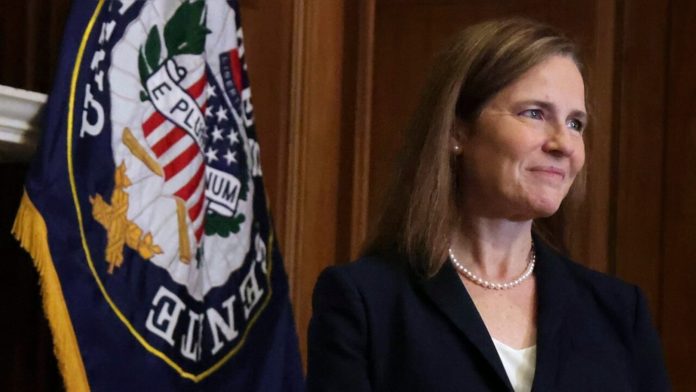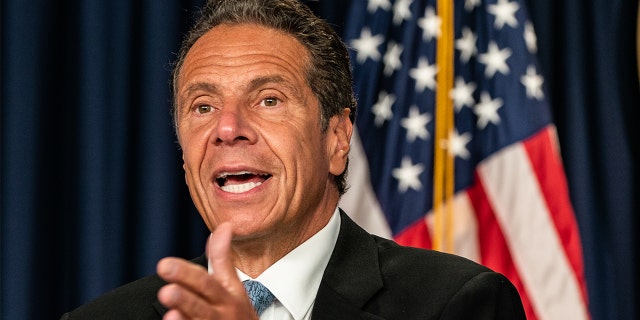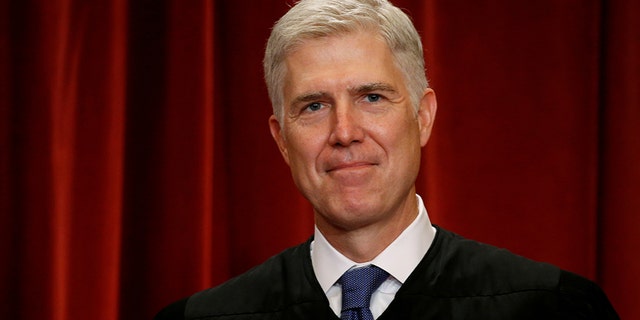

The U.S. Supreme Court on Wednesday night blocked New York Gov. Andrew Cuomo from reimposing strict attendance caps at worship services in areas hit hard by the novel coronavirus.
The court ruled 5-4 to bar Cuomo from enforcing his Oct. 6 “Cluster Initiative” against houses of worship that sued to challenge the restrictions.
The order was also the first in which Justice Amy Coney Barrett played a decisive role. Barrett, who was President Trump’s third Supreme Court nominee, joined the court Oct. 27, after winning Senate confirmation following the Sept. 18 death of Justice Ruth Bader Ginsburg.
Meanwhile, Chief Justice Roberts joined the court’s liberal wing in the dissenting opinion, which stated the court had acted rashly.
Cuomo’s initiative had created color-coded limits on mass gatherings and business operations, in an effort to stem the outbreak in New York City areas that were experiencing a surge in cases, according to Bloomberg News.


New York Gov. Andrew Cuomo speaks during the daily media briefing at the Office of the Governor of the State of New York on July 23, 2020 in New York City. (Getty Images)
It was aimed at worship services at some synagogues and Roman Catholic churches in parts of Brooklyn and Queens, Bloomberg reported.
 In the hardest-hit areas, which were designated red zones, the state limited attendance in houses of worship to 25% of their capacity or 10 people, whichever is fewer. The majority said his limits violated the First Amendment’s protection of the free exercise of religion.
In the hardest-hit areas, which were designated red zones, the state limited attendance in houses of worship to 25% of their capacity or 10 people, whichever is fewer. The majority said his limits violated the First Amendment’s protection of the free exercise of religion.
Justice Neil Gorsuch, in the concurring opinion, said Cuomo had treated religious activities less favorably than nonreligious ones, according to the New York Times.
“It is time — past time — to make plain that, while the pandemic poses many grave challenges, there is no world in which the Constitution tolerates color-coded executive edicts that reopen liquor stores and bike shops but shutter churches, synagogues, and mosques,” wrote Gorsuch, who was also named to the court by President Trump.


U.S. Supreme Court Justice Neil Gorsuch. (Reuters)
“So, at least according to the Governor, it may be unsafe to go to church, but it is always fine to pick up another bottle of wine, shop for a new bike, or spend the afternoon exploring your distal points and meridians,” he continued, according to a tweet from The Economist correspondent Steven Mazie. “Who knew public health would so perfectly align with secular convenience?”
The ruling was seen as a reversal from earlier actions taken during the pandemic this year by the high court in response to state restrictions on organized religion, reports said. The justices previously refused to lift restrictions on churches in California and Nevada.
In the dissenting opinion, Roberts explained why the court’s liberals opposed the decision.
“Numerical capacity limits of 10 and 25 people, depending on the applicable zone, do seem unduly restrictive,” Roberts wrote, according to the Times. “It is not necessary, however, for us to rule on that serious and difficult question at this time.”
“The governor might reinstate the restrictions,” he continued. “But he also might not. And it is a significant matter to override determinations made by public health officials concerning what is necessary for public safety in the midst of a deadly pandemic. If the governor does reinstate the numerical restrictions the applicants can return to this court, and we could act quickly on their renewed applications.”
(Fox News).





